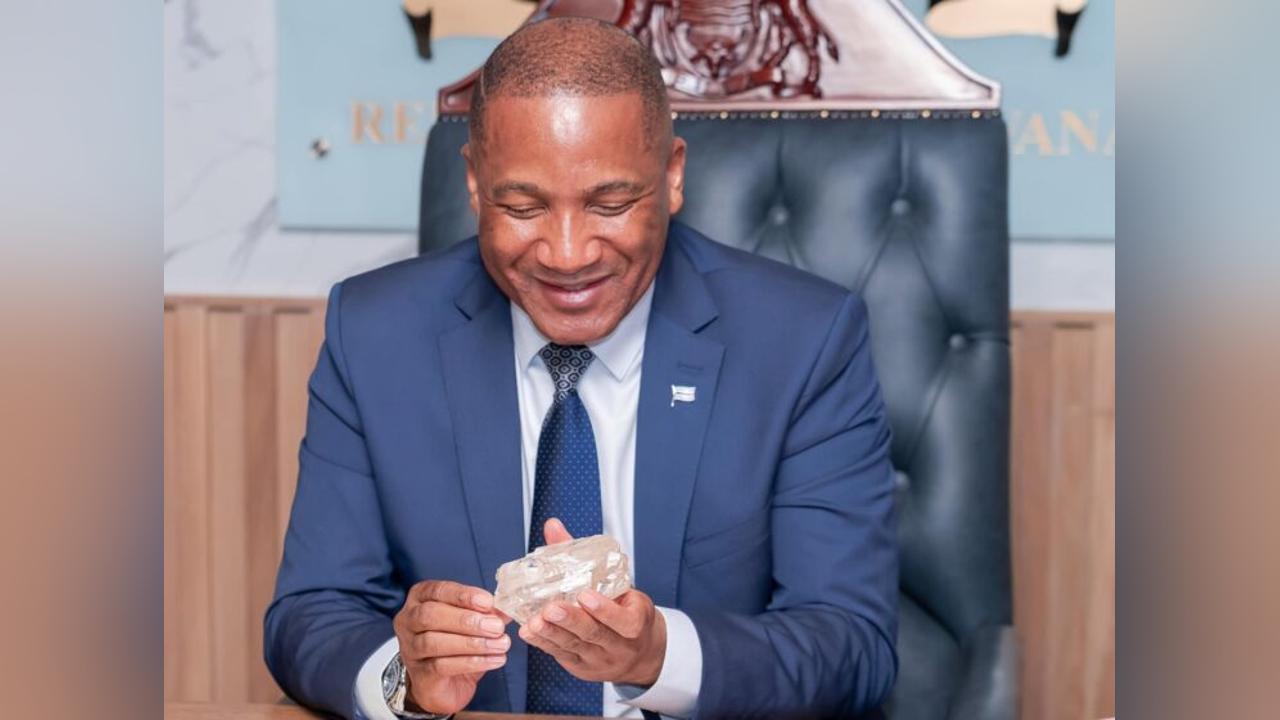Africa-Press – Botswana. In a sharp commentary, South African Signal Risk analysts Ronak Gopaldas and Menzi Ndhlovu have labelled President Duma Boko’s recent remarks against De Beers as a “classic case of where opportunism meets political theatre,” suggesting the statements are aimed more at managing domestic pressure.
President Duma Boko has come under intense scrutiny following a series of blistering attacks on diamond giant De Beers, a move analysts warn could backfire, rattling investor confidence and undermining Botswana’s long-standing reputation for economic stability.
In recent weeks, Boko has embraced a confrontational stance toward De Beers, accusing the company of exacerbating the country’s economic challenges. He has tied Botswana’s fiscal and trade woes to what he calls an imbalanced relationship with the global diamond powerhouse — a message analysts say is as risky as it is politically calculated.
“This is a case where opportunism meets political theatre,” said Ronak Gopaldas and Menzi Ndhlovu of Signal Risk, a South African political and economic risk advisory firm. “President Boko’s mixed messaging creates policy uncertainty and reflects a posture aimed at managing domestic pressures rather than long-term economic sustainability.”
Hardline approach
Tensions began simmering in June when Boko declared that “no minerals will leave the country without being processed,” signaling a hardline approach to mineral beneficiation. But the rhetoric has escalated in recent weeks, despite Botswana signing a landmark 10-year deal with De Beers in February — a deal hailed for expanding local diamond access, enhancing value addition, and fostering joint marketing initiatives.
Observers now question whether Boko’s remarks reflect a genuine policy shift or are part of a broader political performance to rally domestic support and shift blame amid a worsening economic outlook.
Populist overtures
“Boko’s populist overtures serve multiple domestic agendas,” the analysts noted. “They deflect blame for economic underperformance, help manage tensions within his governing coalition, and resonate with an electorate hungry for immediate solutions.”
Botswana is also bracing for a projected decline in revenues from the Southern African Customs Union (SACU), which constitutes over 30% of national tax income. The economic squeeze has forced the government to tap into sovereign reserves while struggling to fulfill promises on jobs, housing, wage increases, and climate adaptation.
Greatest casuality-investor confidence
Signal Risk analysts warn that the greatest casualty may be investor confidence. Botswana’s brand has long hinged on political predictability and clear economic communication, attributes now threatened by seemingly contradictory messages.
“The government’s recent attacks on De Beers, coming just months after a major agreement, send destabilizing signals,” said Gopaldas and Ndhlovu. “The inconsistency could prompt credit downgrades, higher borrowing costs, and reduced foreign direct investment.”
Risks
Adding fuel to the fire, Minerals Minister Bogolo Kenewendo recently told the Financial Times that Botswana is pursuing a controlling stake in De Beers following the planned sale by Anglo American. The move, framed as a strategic bid for value chain oversight, has deepened unease in investment circles.
“This situation could easily escalate before it de-escalates,” the analysts warned. “Without a credible, face-saving off-ramp, Boko’s approach risks morphing into a dangerous gambit with lasting consequences for Botswana’s economic future.”
Gopaldas and Ndhlovu point to parallels in other African nations, where nationalist pivots, such as in Tanzania under John Magufuli and Zambia under Edgar Lungu, initially won public favor but ended up alienating critical investors.
“Credible, collaborative and transparent engagement is essential to achieving equitable growth in the extractive industries,” the analysts concluded.
\
For More News And Analysis About Botswana Follow Africa-Press






